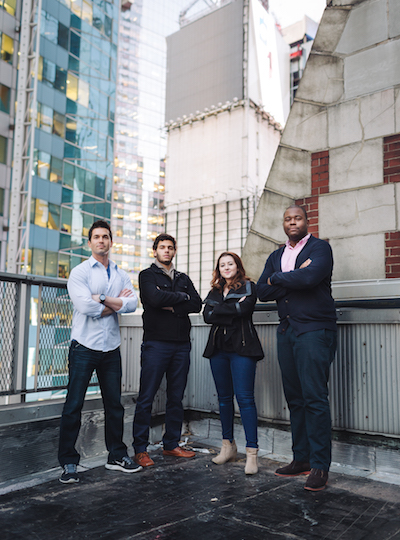When David Warren’s father, Steve, was diagnosed with a rare, complex form of brain cancer, he and his family knew that his career as a lawyer would likely be over.
The doctors removed part of his brain, and though he was still smart, recalls Warren, he “wasn’t going to be as smart as he was.”
Warren remembers his father saying “If I can’t practice law, what am I here for? I might as well just die.”
And he wasn’t about to accept that.
“I’ve got to get this guy the best treatment we can,” thought Warren. “And I’ve got to find him a purpose.’”
Before Warren’s father passed away, they founded Take the Fight, a nonprofit organization that pairs “an army of top university students” with cancer patients for a year.

Since founding the organization in late 2012 and initially operating on a 100 percent volunteer basis, Warren has grown Take the Fight to now include a team of three staff members, a medical advisory board, an advisory board of former Take the Fight students, and a board of cancer survivors.
And the years of hard work are paying off: this month, Take the Fight is training 50 new students to be paired with cancer patients at its Wake Forest office, as part of a National Institutes of Health-funded clinical study.
Take the Fight students attend appointments with their assigned patients, help them understand their diagnoses better, and just generally act as a caring and dedicated support system. Doctors aren’t able to spend a lot of time with each patient, so having someone else there taking notes, explaining things in more depth, or helping with mountains of paperwork can make a world of difference.
The goal is to not only provide some much-needed extra attention, but to mobilize the country’s best and brightest to start thinking critically about the way we care for people who are sick.
“Right now, they’re just being underutilized,” says the WeWork Times Square member. “Students are out there like, ‘Give me something with meaning to do.’”
Robyn Lessans was one of those students. After completing the one-year fellowship, Warren brought her on full-time as chief operating officer. Lessans says the experience has been completely eye opening.

“You think if you have cancer, you just need to get your radiation treatment, and your chemotherapy, and that’s it,” she says. “But then there are all these factors, like they have to get there and if [the patient lives] an hour away, if her husband has to drive her both ways, he has to take off three hours of work each day. How are they going to pay the bills? And they have to file for disability, and all these other factors that really do add to the stress component.”
It’s those kinds of systemic challenges that Take the Fight ultimately wants to change. This year, the company is adding a second year to its fellowships where, after working one-on-one with their patients, students will now spend a year developing projects and campaigns that address the roadblocks they found in their first year as fellows.
“I think that’s really where you’re going to see a lot of impact,” Warren says.
As Warren talks about his work and the impact he wants to make on the world, it’s clear that it always traces back to honoring his dad’s legacy.
“One of my friends is an ethics professor at a medical school,” he says. “I felt guilty about dad dying and that I couldn’t fix it, and he was like, ‘You know, you can’t save everyone. And no one lives forever. But what you can do is improve everyone’s care. Think of the gift that you and your father share together: a gift of a new narrative, a more powerful narrative, a special story together.’”
Photo credit: Emanuel Hahn




